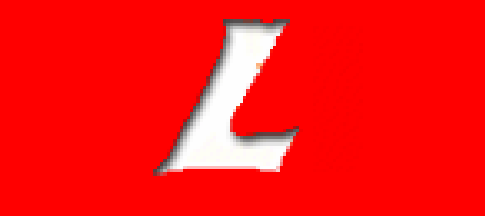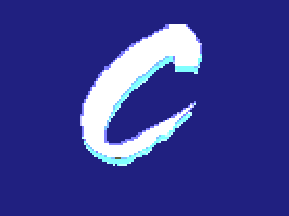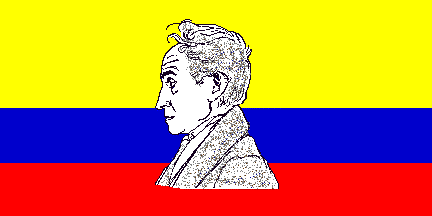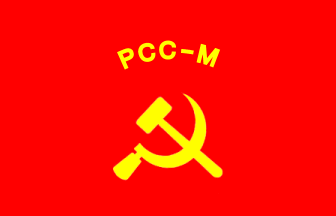
image by Eugene Ipavec, 11 April 2006

Last modified: 2006-06-09 by dov gutterman
Keywords: colombia |
Links: FOTW homepage |
search |
disclaimer and copyright |
write us |
mirrors
Editorial Remark: It must be noted that all the opinions are of the authors and not of FOTW. Our site is non-political and concentrates only on vexillological issues.
See also:
Next Sunday, March 12, 2006, there will be general elections
for Congress. There is a website by the country's electoral
authority where they show an example of a voting sheet at <www.registraduria.gov.co>.
This image includes all current political parties that have
candidates for Congress (both Senat and House of
Representatives). There you will find logos of each political
party/movement.
E.R., 9 March 2006

image by Eugene Ipavec, 11 April 2006
I came across this image during a ceremony of the Peace
Process between the Colombian Government and the AUC (biggest union of paramilitary
groups in Colombia).
The image is a green ribbon in the middle (meaning peace) on a
white background. This image was seen during a demobilization of
AUC troops, especifically in one of the ceremonies of the many
subfactions that are part of the ACBCB
- Autodefensas Campesinas - Bloque Central Bolívar.
Source: <www.terra.com.co>
E.R., 11 April 2006
Both were founded in 1848, the Partido Liberal Colombiano -
Liberal Party's traditional color is red, and the Partido
Conservador Colombiano - Conservative Party's traditional color
is blue. They've shared power for most of the XIX and XX
centuries, a famous joke says that the true meaning of the
Colombian flag is: Yellow for our riches, blue and red for those
that distribute them among themselves. The "L" and
"C" were adopted as "official logos" and
featured in the flags.
Jaime Vengoechea, 10 Febuary 2003

image resized from <www.partidoliberal.org.co>
The official website of the PLC (Partido Liberal Colombiano,
Colombian Liberal Party) is <www.partidoliberal.org.co>.
The explanation of the symbols (taken form the official website):
"The red color, as interpretation of love, fraternity and
tolerance, is the standard of the Colombian Liberal Party and it
will go together with the current symbol and also with the
International Socialist, to which is affiliated".
E.R., 30 May 2005

image by Jaime Vengoechea, 10 Febuary 2003
The official website of the Partido Conservador Colombiano
(Colombian Conservative Party) is <www.partidoconservador.com>.
E.R., 30 May 2005

image by Guillermo Aveledo, 30 November 2000
Here's the flag of the Movimiento Bolivariano para la Nueva
Colombia (Bolivarian Movement for the New Colombia), what has
been instituted as the political wing of the Revolutionary
Armed Force of Colombia - People's Army (FARC-EP), and
founded early this year.
The flag is a typical Colombian tricolori, with a portrait of
Simon Bolivar (in black and white and certain shades of grey)
centered on it. The portrait used is a reproduction of the famous
(and supposedly more accurate) portrait of Bolivar engraved by
French artist Francois Desire Roulin (1796-1874) at Bogota dated
February 15th, 1828.
Oddly enough, it seems an unbecomig choice for a revolutionary
party/army: by 1828 Bolivar was serving as dictator of Colombia
(then the Great Colombia; the union of Nueva Granada, Quito and
Venezuela), allied with conservative and clerical groups who were
interested in the union of the republics and, willing to support
Bolivar, played for the predominance of Bogota in such an union.
The rest is history. Perhaps this paradox is explained by the
fact that, in the actual portrait, Bolivar faces rightwards, and
not leftwards, as is used by the FARC-EP.
Guillermo Aveledo, 30 November 2000
The flag size should be the same as the Colombian one and the
face of Simón Bolívar should be on yellow background instead of
white, and looking towards the right, and not look towards the
left.
Source: Picture taken on August 29, 2000, during the
launching of the illegal movement by the Farc at <www.sedoparking.com>.
E.R., 4 June 2006
There is a political movement in Colombia called
"Movimiento Compromiso Civico Cristiano con la
Comunidad" (Civilian Christian Committment with the
Community Movement) which is abbreviated as PC4, which stands for
Partido C4 (or C4 Party). It currently has one seat in Colombia's
Senate. Its official website is <www.pc4.org>.
E.R., 16 June 2005

image by Eugene Ipavec, 27 May 2006
There is a flag on plain red background, resembling the same
colors as the Partido Comunista Colombiano (Colombian
Communist Party). This flag is the flag of the PCCC, which
stands for Partido Comunista Colombiano Clandestino (Colombian
Clandestine Communist Party), an organization that runs parallel
to Movimiento Bolivariano para la Nueva Colombia (Bolivarian
Movement for the New Colombia). This PCCC organization is an
organization created by the FARC in
order to replace the original PCC (Colombian Communist Party)
because the Farc believes that the PCC is not radical enough and
does not consider armed struggle to reach power. The flag is, as
I mentioned before, a plain recangular red flag, with the letters
PCCC in black on the flag in diagonal form starting from the
bottom left and ending on the top right, on the top right having
a yellow hammer and sickle.
Sources: Resistencia - Farc online magazine at <redresistencia.org>.
ANNCOL - Farc news website at <www.anncol.org>.
Semana magazine edition
October 1, 2001, page 52.
E.R., 27 May 2006
Unusual in a communist flag for the emblem to be in the fly.
Eugene Ipavec, 27 May 2006
Variant

image by Eugene Ipavec, 30 May 2006
I found a variant of the flag of the PCCC. This time the
letters appear in white, plus the hammer and sickle (also in
white). Background is plain red and the design resembles pretty
much the flag of the PCC.
Source: <www.anncol.org>.
E.R., 30 May 2006
PCC stands for Partido Comunista Colombiano (Colombian
Communist Party). This organization was established in 1930. Its
official website is <www.pacocol.org>.
E.R., 23 March 2005

image by Eugene Ipavec, 23 December 2005
The Partido Comunista de Colombia - Maoísta (Colombian
Communist Party - Maoist) is a split group from the PCC
(Colombian Communist Party). The PCC-M was established in 2001.
It has an official wensite: <pccm0.tripod.com>. the
PCC-M's flag is the same as the PCC's flag regarding ratio of the
hammer and sickle.
E.R., 23 March and 23 December 2005
The Partido Comunista de Colombia - Marxista Leninista
(Colombian Communist Party - Marxist Leninist) was a split group
of the Colombian Communist Party, established in 1967. The armed
wing of the PCC-ML was the EPL (Ejército
Popular de Liberación).
E.R., 23 March 2005
In the 1960's communist revolutionaries in Columbia (FARC)
proclaimed the Republics of Marquetalia and Riochiquitos, that is
an experiment of comunist-countryman administration in Latin
America.
The flag used was probably the FARC flag (red with the name?).
But I found now the local flag of Marquetalia:
This is green borderes white. In the centre is a torch white and
golden, with flamme yellow and red.
Another city of the territory is named MARULANDA, and this is the
name of the FARC head, Manuel Marulanda named too "Tiro
Fijo" (Fix Shooting). The flag of the city is black, white
and green horizontal.
More information?
Jaume Olle , 24 November 1996
About the Communist Revolution and its flag, I'm not aware
that they had a flag, but the actual Independent Republics were
seven: Marquetalia (in the border between the Departments of
Tolima and Huila), Río Chiquito (in the border between the
Departments of Cauca and Huila), El Pato (in the Department of
Caquetá), Guayabero, El Duda, Alto Ariari (all three of them in
the Department of Meta) and Alto Sumapaz (in the border between
the Departments of Meta, Cundinamarca and Tolima) Marquetalia
being the most important. These existed from 1955 through 1965
but they became known in a Congress debate in 1964, and short
afterwards there was a military operation against them. These 7
"Republics" were in an area plenty of mountains and
forrest, along with tall hills and stuff, and they were pretty
much together (if you have a Colombian map you can see that they
are close to each other).
E.R., 19 January 1999